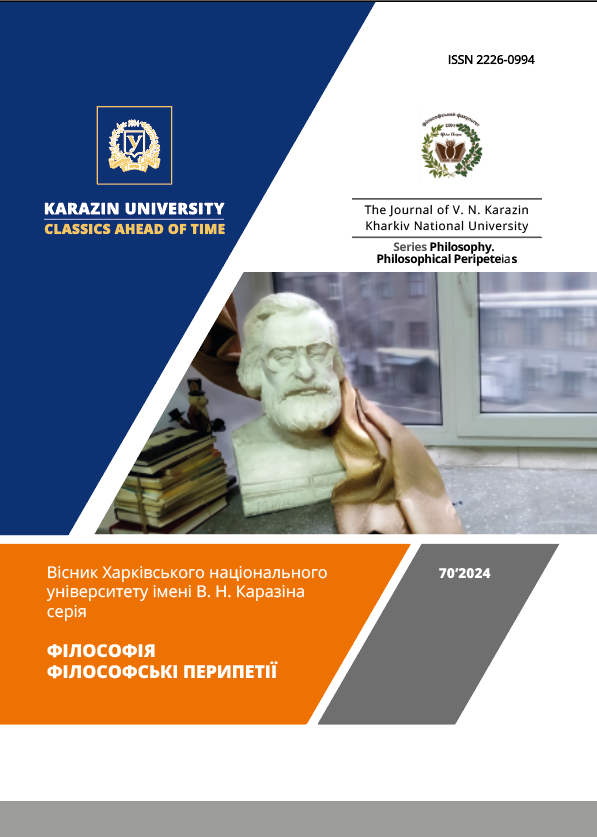PHILOSOPHICAL «DISSECTION» OF ACADEMIC LIBRARY: UKRAINIAN CONTEXT
Abstract
The article analyses the situation of the progressive «uselessness» of the classic activities of academic libraries, which has so worsened now by the dominance of digital content, by more easy search and comfortable remote access to it and, in general, by successes and expanse of information sciences and technologies that supply the present knowledge economy. But the very unenviable situation of Ukrainian academic libraries is additionally burdened by two national factors. First of all, it is the persistent habit and the past \ Soviet experience that tempt librarian staff to prolongs to think of librarianship by outdated terms and concepts, and understand of his professional activity as fundamentally state-related. Second, it is the current military-political circumstances, when the state authorities put pressure on libraries – in fact, to restore former institutional functions of control and supervision. So, if Ukrainian academic libraries try to be all-round loyal – they risk being trapped in a subservient identity that always returns in new forms, but will be never replaced by another kind.
The alternative to this stupor is an unpleasant way in detour of the honoring the own glorious past to the realization that today Ukrainian academic libraries have to provide own effective politic – that is, to invent «non-traditional» forms of activity that prove their usefulness-suitability in the knowledge field, determined by the four base vectors: market, service, science-education and enlightenment. In order not to play only the sad role of unfunded buyers in a prestige market, they have to make a certain shift-return to the spirit of enlightenment and even use some «medieval» practices – by considering the actual educational needs. This means that for Ukrainian academic libraries the time has come partly to transform into functional, convenient and friendly places-environments where professionally verified and organized digital content is hand-made create, collected, prepare and being legalized.
Downloads
References
Barthes, R. (1984). De l’oeuvre au Texte. In Essais critiques IV. Le bruissement de la langue (pp. 69–78). Paris: Éditions du Seuil.
Barthes, R. (1984a). Sur la Lecture. In Essais critiques IV. Le bruissement de la langue (pp. 37–48). Paris: Éditions du Seuil.
Derrida, J. (2001). Le livre à venir. In Papier machine : le ruban de machine à écrire et autres réponses (pp. 15–31). Paris: Galilée.
Derrida, J. (1990). Les pupilles de l’Université. Le principe de raison et l’idée de l’Université. In Du droit à la philosophie (pp. 461–498). Paris: Galilée.
Eco, U. (2016). Sulla labilità dei supporti. In Pape satàn aleppe : cronache di una società liquida (pp. 352–354). Milano: La nave di Teseo.
Floridi, L. (2002). On Defining Library and Information Science as Applied Philosophy of Information. Social Epistemology, 16, 37–49. DOI: 10.1080/02691720210132789
Foucault, M. (2013). La bibliothèque fantastique : A propos de “La Tentation de saint Antoine” de Gustave Flaubert. Retrieved from www.labibliothequefantastique.net 22.01.2024
Foucault, M. (1966). Les mots et les choses : une archéologie des sciencies humaines. Paris: Éditions Gallimard.
Fuller, S. (2016). The Academic Caesar: university leadership is hard. New York: SAGE Publications.
Gradmann, S. (2014). From containers to content to context. The changing role of libraries in eScience and eScholarship. Journal of Documentation, 70(2), 241–260. DOI: 10.1108/JD-05-2013-0058
Hernon, P., & Matthews, J. R. (Eds.). (2013). Reflecting on the future of academic and public libraries. Chicago: ALA Editions an imprint of the American Library Association.
Hjørland, B. (2018). Library and Information Science (LIS). Part 1. Knowledge Organization, 45(3), 232–254. DOI: 10.5771/0943-7444-2018-3-232
Humboldt von, W. (1960). Über die innere und äussere Organisation der höheren wissenschaftlichen Anstalten in Berlin. In Freie Universität Berlin. Idee und Wirklichkeit einer Universität: Dokumente zur Geschichte der Friedrich-Wilhelms-Universität zu Berlin (ss. 193–202). Berlin: De Gruyter.
Kant, I. (1917). Der Srteit der Facultäten. In Kant’s gesammelte schriften. Band VII. (ss. 1–116). Berlin: Georg Reimer.
Kulish, Yu. (2023). Peculiarities of the Digital Environment of the University Libraries on the Modern Stage. Ukrainian Journal on Library and Information Science, 11, 10–20. DOI: 10.31866/2616-7654.11.2023.282651 (In Ukrainian).
Litwin, R. (2009). Preface. In Cossette, A., & Litwin, R. Humanism and libraries: an essay on the philosophy of librarianship. (pp. vii–xi). Duluth: Library Juice Press.
Nethercutt, E. (2023). The Absence of Philosophy in Library and Information Science. Library Philosophy and Practice (e-journal). 7940. Retrieved from https://digitalcommons.unl.edu/libphilprac/7940 21.01.2024
Osburn, C. B. (2009). The social transcript: uncovering library philosophy. New York: Libraries Unlimited.
Peters, M. A., Neilson, D., & Jackson, L. (2022). Post-marxism, humanism and (post)structuralism: Educational philosophy and theory. Educational Philosophy and Theory, 54(14), 2331–2340. DOI: 10.1080/00131857.2020.1824783
Readings, B. (1996). The university in ruins. Cambridge: Harvard University Press.
Salisbury, F., & Peseta, T. (2018). The «Idea of the University»: Positioning Academic Librarians in the Future University. New Review of Academic Librarianship, 24(3-4), 244–264. DOI: 10.1080/13614533.2018.1472113
Serres, M. (2012). Petite poucette. Paris: Le Pommier.
Zwadlo, J. (1997). We Don’t Need a Philosophy of Library and Information Science: We’re Confused Enough Already. The Library Quarterly: Information, Community, Policy, 67(2), 103–121.
Copyright (c) 2024 Михайло Шильман

This work is licensed under a Creative Commons Attribution 4.0 International License.
Authors who publish with this journal agree to the following terms:
- Authors retain copyright and grant the journal right of first publication of this work under the terms of a license Creative Commons Attribution License 4.0 International (CC BY 4.0).
- Authors are able to enter into separate, additional contractual arrangements for the non-exclusive distribution of the journal's published version of the work (e.g., post it to an institutional repository or publish it in a book), with an acknowledgement of its initial publication in this journal.
- Authors are permitted and encouraged to post their work online (e.g., in institutional repositories or on their website) prior to and during the submission process, as it can lead to productive exchanges, as well as earlier and greater citation of published work.






3.gif)




